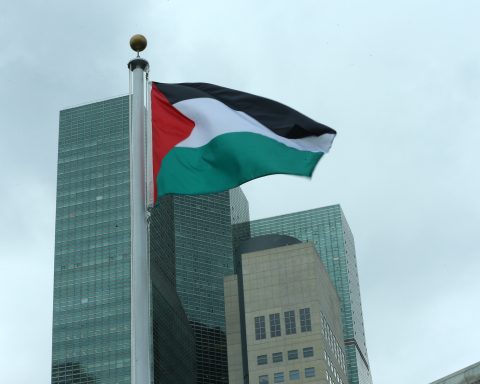Gulf countries have recently come to the fore with their normalization steps with Israel. So much so that this rapprochement became visible in 2020 with the political normalization process between Israel, the United Arab Emirates (UAE), and Bahrain.
Yet, this situation cannot be considered as an instantaneous process, but one that has developed gradually for the last 20 years. Indeed, after the September 11 terrorist attacks against the US in 2001, Gulf-Israel relations began to develop in the pretext of lobbying activities, especially in and around US institutions. In this sense, Gulf countries such as the UAE, Saudi Arabia, and Qatar, which pursue active foreign policies; as well as those which remain passive foreign policy actors such as Oman and Bahrain, are known to have intelligence, commercial and social relations with Israel in the pre-normalization era. In addition, the recent political rivalry with Turkey and the prevention of Ankara’s influence in the region can be considered as the motivations behind the direct or indirect alliances of countries such as the UAE, Saudi Arabia, and Bahrain with Israel.
Different responses to Israeli attacks
The recent attacks by the Israeli forces on Gaza following the Sheikh Jarrah incidents have raised questions about the future of the Gulf countries’ normalization trend with Israel. Although the Gulf countries condemned the attacks carried out by Israel as a discourse, called for a ceasefire, and defended the rights of the Palestinians; the political positions assumed by the leading countries in normalization, namely the UAE and Bahrain, could not go beyond statements in line with their pragmatic tendencies. Similarly, as Saudi Arabia could not take a clear stance against the Israeli attacks, it was met with strict criticisms by the Arab public opinion. On the other hand, it was seen that Qatar and Kuwait had a much clearer stance; there were even protests in Doha in response to Israeli attacks. Considering the first-hand statements made by the Gulf countries regarding the aforementioned attacks and the subsequent developments, it can be concluded that there is a difference of opinion in the Gulf regarding Israeli aggression against Palestine. The divergence of foreign policies in the Gulf will be further highlighted by the reactions to normalization tendencies with Israel in the face of the recent attacks.
Developments such as the forming of a new government in Israel, the ascend of the coalition government of former Israeli Defense Minister Naftali Bennett to power and replacing the long-serving Prime Minister Benjamin Netanyahu, and the vociferous global backlash against Israel’s latest attacks may also endanger the future of normalization and deepen the uncertainties in question.
At first glance, it seems that the Gulf countries have to find a balance between approaching Israel and formulating a policy toward the Palestinian issue based on Arab identity. From Saudi Arabia to Bahrain, the Gulf countries, with varying capacities of influence both in their sub-region and among the states in the Middle East, approach the Palestinian issue without compromising their Arab identity at the level of discourse. Indeed, the UAE and Bahrain, which laid the groundwork for the normalization with Israel, had justified their normalization steps by stating that this would present “a good future for Palestine” and “prevent Israel from occupying and annexing Palestinian lands”. Other influential countries in the region such as Saudi Arabia and Qatar conditionally rejected normalization with Israel and considered the establishment of a Palestinian state in line with the borders and resolutions before the 1967 Arab-Israeli War as a condition for normalization. Although Saudi Arabia and Qatar will also want to take advantage of the political, diplomatic, military, and economic benefits of normalization in a pragmatic sense, there are certain obstacles to normalization for different reasons, in particular for these two countries.
The stance of Saudi Arabia and Qatar
For Saudi Arabia, there appears to be serious pressure on Crown Prince Mohammed bin Salman, especially by Jewish political circles in the US, to involve Saudi Arabia in the normalization process. On the other hand, the deep negative perception of the Saudi public opinion towards normalization with Israel does not allow much room for maneuver for the Riyadh administration, under the guidance of Crown Prince Mohammed bin Salman. Therefore, it can be said that the starkest obstacle to Saudi Arabia’s normalization with Israel will be the Saudi public. As a matter of fact, due to these delicate balances, Saudi Arabia appears to be refraining from directly opposing Israel on the Palestinian issue and adopts a limited and critical language only at the level of discourse.
Qatar, on the other hand, has managed to preserve its developing commercial relations with Israel for some time, especially since the end of the 1990s, but both domestic changes and regional developments prevented the Doha administration from initiating normalization dialogues with Tel Aviv. Just like Kuwait, Qatar did not remain confined to discourse in its support for Palestine and the Palestinians and put its support into practice, especially through multi-million-dollar projects in Gaza and its vicinity. This was evident in Israel’s targeting of certain points belonging to Qatar during its attacks in Gaza. The fact that the building hosting the Gaza office of Al Jazeera, and the headquarters of the Qatari Red Crescent were targeted during the bombardments can be interpreted as Israel’s indirect punishment of Qatar.
The fate of the normalization process
While there are such divergent agendas among the Gulf countries regarding normalization with Israel, another question is how Israel’s aggressive policies and indiscriminate attacks will impact the normalization process. In reality, the most important development hindering the normalization trend is not the recent attacks by Israel, but the change in government in the US. The Trump administration, which established close strategic relations with the Sunni monarchies in the region, made efforts to align the foreign policy objectives of these countries with those of Israel and was highly successful in doing so. However, the Biden administration’s drift from the Sunni monarchies and instead focusing in its foreign policy on preventing the rise of China, withdrawing from Afghanistan, and balancing China in cooperation with the security-oriented platforms in the Asia-Pacific such as the Quadrilateral Security Dialogue, caused Washington to depart from its previous stance on the Israel-Gulf normalization. The Biden administration has signaled that it would prioritize the search for solutions, especially in the face of the ongoing crises; showing that Washington may set issues such as Iran, Yemen, Syria, and Libya as the main agenda items in Middle Eastern politics in the upcoming period. Therefore, it can be predicted that the US under the Biden administration will not focus on creating new alliances as it did in the Trump era, and thus will not tend to support normalization movements between Israel and Arab countries as decisively as before.
In addition to the inauguration of the Biden administration, the recent Israeli attacks have also led to different reactions from the Gulf countries in terms of normalization. Qatari Minister of Foreign Affairs, Mohammed bin Abdulrahman Al-Thani stated that normalization with Israel is unlikely, and therefore, he signaled a shift in Qatar’s foreign policy from a pragmatic stance into a more principled one. In addition, the recent drafts of penal measures and sanctions in Kuwait against those who have close relations with Israel reveal the country’s clear stance against normalization. Kuwait’s reaction to Israel’s latest attacks can also be considered as an indicator of this situation.
Yet, no serious change is observed in the foreign policy strategy of countries such as the UAE and Bahrain following the recent attacks by Israel. Although harsh reactions remain at a public level in the UAE and Bahrain, it is observed that the political elites and the people supported by these elites are still trying to justify Israel and legitimize its actions both in social and traditional media. All these indicate that normalization trends will proceed differently in different countries in the region, but also that the process may be interrupted due to regional and international issues.













